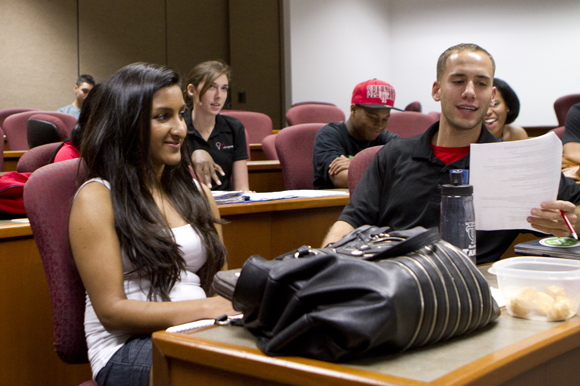Connections: Entrepreneur Clubs Ideate, Create Solutions For the World
Increasingly popular academic programs in entrepreneurship at the University of Tampa and the University of South Florida St. Petersburg attract creative, independent thinkers intent on developing their ideas for the global marketplace.
Nick Chmura admits he wasn’t born with the entrepreneurial spirit.
“I didn’t know anyone who started their own businesses. What I knew is you go to school, you get an education and then you go to work for someone, work hard and are good to your family. The idea of entrepreneurship as being able to start your own business and fulfill your destiny was something that I never really understood,” says the 21-year-old who graduated this spring from University of Tampa‘s finance program. “Working with the UT Entrepreneurs club, I learned that I can make my own destiny.”
While attending UT and participating as an active club member, Chmura launched Betterboo, an online tool that uses Amazon and Facebook to help web visitors find and purchase gifts and a site which Inc. magazine has dubbed one of the coolest college start-ups of 2012. Chmura first pitched the concept to fellow club members and at an entrepreneurship conference in Chicago in fall 2010. By later that same year, he caught the attention of his first prospective investors.
Strength In Numbers
Jasmine Rustogi has been actively involved with UT Entrepreneurs since her freshman year, initially as a recruitment chair and most recently as VP. Hailing from a family of entrepreneurs, Rustogi says the idea of being her own boss appealed to her, but she was not always comfortable voicing her ideas. That is, until the entrepreneurs club.
“When I was a freshman and had a new idea, I wouldn’t be so quick to say it, but now, I’m not scared to just throw it out there,” she says. “I’ve learned that you have to be confident in your ideas and decisions.”
Rustogi, who graduates in spring 2013, says the group maintains 40-plus members whose steady attendance and participation at weekly meetings, networking functions and speaking events demonstrate their dedication to the student-led organization and to each other. The group is open to UT graduates and undergraduates who are encouraged though not required to attend weekly meetings where members share ideas and take part in practice pitch sessions, while peers respond with constructive criticism and suggestions. That cooperative spirit extends across the Bay, as UT members collaborate throughout the year with The Entrepreneurship Club at University of South Florida-St. Pete. In March, USF club members assisted UT during the regional Southeast Entrepreneurship Conference (SEEC), which UT hosted for a third year. The two groups have also partnered on other networking events.
“We were able to share resources, information and event discounts with each other and then pass that on to our members,” says Jessica Barnett, former president for the USF student organization. “From a regional perspective, the more organizations work together to ‘bridge the Bay,’ the better off the entire Tampa Bay area will be.”
A New Breed of Entrepreneur
Rebecca J. White, PhD, is a professor of Entrepreneurship at UT’s Sykes College of Business, the James W. Walter Distinguished Chair of Entrepreneurship and director of the school’s Entrepreneurship Center. As someone with a front-row seat to evolving trends in technology, innovation and business leadership, White is optimistic about the impact this new entrepreneurial blood will have on the global marketplace of the future.
“I see them pursuing bigger opportunities with a goal of building more significant companies than even five years ago. The students today seem to value and understand the importance of collaboration,” she says. “They value community and team effort and seem to be comfortable with sharing the founder spotlight.”
White also notes that many of these students have watched their own families experience the impact of downsizing at the hands of large corporations and that this may have influenced a desire to launch their own companies.
“They have more confidence in themselves than in someone else to take care of them,” she says.
Nurturing Solution Seekers
When Paul Szoldra made the decision to leave the Marine Corps after eight years, he knew he wanted to go to college and use tuition benefits earned through the G.I. bill but wasn’t sure where to start. He took a cue from other entrepreneurs and attempted to craft a solution: CollegeVeteran.
Launched in early 2012, the site still has room to grow, says Szoldra, but its primary mission is to provide vets access to information about college options available as well as any veteran-related programs or clubs on campus. The 28-year-old first pitched the idea to fellow entrepreneur club members at UT where he is a senior entrepreneurship major and graduates this fall. He was impressed with the quality of feedback he received and overall willingness of members to help one another, and has embraced that same philosophy when supporting others, like fellow member and friend Chmura.
“Helping out Nick in writing a press release does not affect my business, but it could certainly help his. He’s a friend, and I want to help him. As long as it’s not in the same industry, there’s nothing wrong with helping out,” Szoldra says. “The highly successful entrepreneurs that I’ve met have taken time to give me advice and they don’t have to do that, but I think they realize they were once in our shoes and were probably helped themselves and want to pay it back.”
Chmura agrees. “People are just helping each other in areas where they have strengths. We want each other’s businesses to do well.”
Sites like Szoldra’s and Chmura’s are just a few examples of entrepreneurs transitioning into the role of solution designer, something that White recognizes as a characteristic of this generation.
“This group of innovators sees themselves as being responsible for ‘fixing’ the problems they see in the world and the economy, so they are putting a big responsibility on themselves,” she says. “Fortunately, they don’t seem to think they have to do this alone.”
Chris Kuhn is a freelance writer living in the ‘burbs of Tampa with her husband and her assistant, a 14-year-old dachshund-Chihuahua. Comments? Contact 83 Degrees.
















